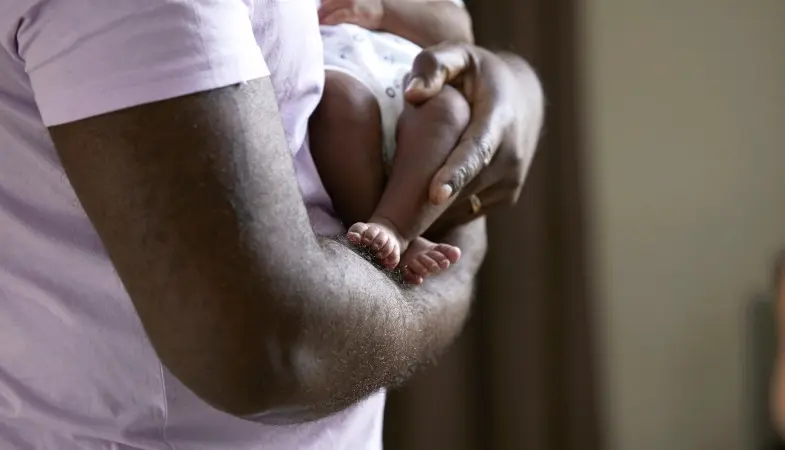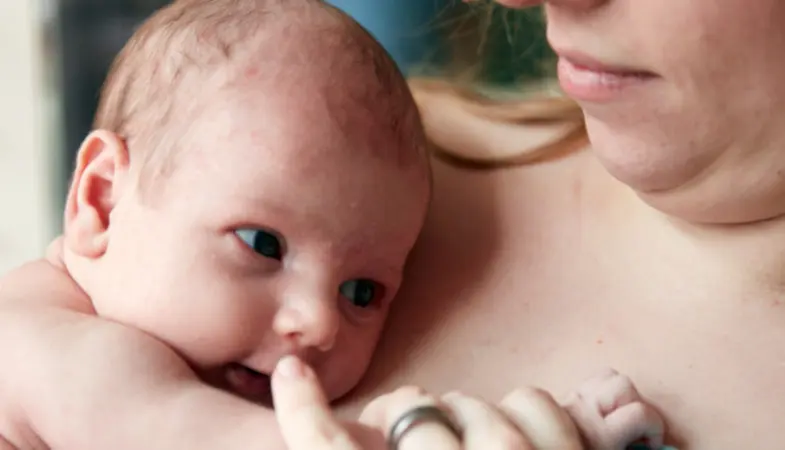Your Changing Body
Pregnancy brings with it many changes. Perhaps the greatest and most immediate change being what happens to your body. Taking extra care of your changing body is important for both you and your baby.
As your pregnancy progresses you will experience physical changes, including backaches, weight gain and fluid retention. However, with proper care and attention to your body you can help manage these changes, which will make getting back in shape easier after birth.
Weight Gain
Try to keep in mind that the extra weight is important for a healthy pregnancy and will eventually come off after you've had the baby.
Concentrate on:
Eating nutritious meals
Cutting out junk food
Exercising regularly (after checking with your doctor first)
Backache
If you experience backache brought on by pregnancy, try these methods for reducing discomfort and getting a good night's sleep (check with your doctor first):
Simple stretching or yoga to strengthen and stretch back and leg muscles
Treat yourself to a massage to relax and loosen tight back muscles
Try sleeping on your side with a pillow between your bent knees to support your lower back
Fluid Retention
Because your body retains more fluid during pregnancy, you may also experience swollen legs, ankles and/or feet (oedema), particularly during your third trimester. To relieve this condition:
Stay off your feet as much as possible
Wear comfortable shoes
Avoid sitting or standing for long periods
Note: Call your doctor if you notice sudden swelling in your hands and face. It could signal a dangerous pregnancy condition called preeclampsia.
Itching
You may also experience itchy skin. it is not uncommon to feel itchy as the skin on your belly and breasts expand. You may also find that certain conditions that normally make you itchy (such as dry skin, eczema or food allergies) make you even itchier when you're pregnant.
To reduce discomfort:
Avoid taking hot showers or baths
Use mild soap
Moisturise with an unscented lotion.
Severe itchiness in the second or, more commonly, third trimester can be a sign of intrahepatic cholestasis of pregnancy, a liver problem that affects up to 1 in 140 pregnant women. Please click here to read more about this condition on the NHS website. If you think that you have cholestasis, call your doctor or midwife immediately. If you do, you'll need to have blood tests to check your liver and ultrasounds to check your baby.
Fast-growing Fingernails
Sometime around the fourth month, your nails may start to grow faster than usual. They may also become softer or more brittle and develop tiny grooves. They should return to normal within a few months after birth.
Taking care of your skin
Whilst common [pregnancy skin changes](/prenancy skincare) pose no health problems, you should always talk to your doctor if your skin is inflamed, blistered, or you have a rash, irritation or itchiness that lasts more than a couple of days.
Because other conditions, unrelated to pregnancy, could bring about skin discolouration, you should always check with your doctor or midwife if you notice any changes, such as a change in the colour or size of a mole, or if pigmentation changes are accompanied by pain, tenderness or redness.
Your doctor will be able to diagnose the condition, and make sure that you are given the appropriate treatment, should it be necessary. Learn more about these skin changes by clicking on a topic below:
Pigmentation changes
Chloasma
(pigmentation changes on your face and neck)
Also known as the 'mask of pregnancy', chloasma has the appearance of brown patches of pigmentation on the forehead, cheeks, and neck. It's caused by an increased production of melanin, the tanning pigment, which protects the skin against ultraviolet light.
Exposure to sunlight will darken the patches, making them more obvious, so protect your skin with a high factor sunscreen (SPF30 or more) and/or hat whenever you go out. If you feel the patches look unsightly, try blending in the colour with a tinted foundation. They will begin to fade within three months of your baby's birth.
Linea Nigra
(dark line running up your tummy)
This is a dark, vertical line, up to a centimetre wide, that appears down the middle of your stomach, often crossing the navel. It tends to appear around the second trimester and is caused by pigmentation in the skin where your abdominal muscles stretch and slightly separate to accommodate your baby as it grows.
This line of pigmentation will fade within a few weeks of delivery, although you may need to give it a gentle rub to remove any dry skin. You will notice that other areas with pigmentation - such as your nipples, moles and freckles - may darken too but this will also fade with time.
What else can I do about these pigmentation changes?
With both chloasma and linea nigra, be sure to get enough folic acid by taking a folic acid supplement and eating foods rich in folates (the natural form of folic acid), such as whole grains and leafy green vegetables. Research suggests that folic acid deficiencies may increase skin discolouration.
Glowing Skin
The 'bloom' or 'glow' of pregnancy is not just a saying. Your skin retains more moisture during pregnancy, which plumps it up, smoothing out any fine lines and wrinkles that you may have. The pinkish glow that makes you look radiant is due to increased levels of blood circulating round your body. This may also make you feel slightly flushed sometimes. The downside of this effect is that you may look puffy from water retention and that any red patches that you already have on your face may become more visible.
Don't try to cut down on drinking water - your body needs fluids - but rest as much as you can. Any red patches will eventually calm down once you've given birth, but if you want to hide them, try using a moisturising foundation.
Spider Veins
These tiny clusters of broken capillaries (small blood vessels), or spider naevi as they are sometimes known, most often appear on the cheeks, and are common in pregnancy, particularly if you are already prone to them. They are caused by the increased volume of circulating blood putting extra pressure on the capillaries, which are also more sensitive during pregnancy.
To reduce the chances of spider naevi appearing, protect your face from extremes of cold or heat, as exposure to either can encourage the problem. The veins will fade once your hormone levels have settled down after delivery.
Spots and Acne
Pregnancy can sometimes trigger acne, which many of us have not experienced since adolescence. Higher levels of hormones can encourage the production of sebum - the oil that keeps our skin supple - and too much sebum causes pores to become blocked, resulting in greasy skin and spots.
Cleanse regularly with a gentle cleanser and use an oil-free moisturiser. Don't use acne creams unless your doctor advises you to do so. A few weeks after delivery, your skin should return to its pre-pregnancy condition.
Stretchmarks
The thin reddish or brownish (depending on your skin colour) lines of stretchmarks usually appear on the abdomen, breasts, upper arms, buttocks and thighs. Stretch marks often occur during the later stages of pregnancy, affecting about eight out of 10 pregnant women. Higher levels of hormones also disrupt your skin's protein balance, making it thinner than usual. After pregnancy, the reddish or brown pigmentation in the stretch marks gradually fades, and the streaks become lighter than the surrounding skin.
Some lucky women have more elastic skin than others, meaning they won't get stretchmarks, but for most of us they are simply a fact of pregnancy. You can't prevent them, but you can try to minimise them by rubbing oil or cream rich in vitamin E over your abdomen to keep it supple, eating a healthy diet and doing gentle exercise. It may take some time for them to fade after pregnancy.
Chafing
As you put on weight, chafing can take place between your thighs or under your breasts, resulting in red, moist skin. Your skin may then become inflamed and blistered and you may notice an odour. This is a condition known as intertrigo.
Keep the affected area as dry as possible and use talc to help absorb any moisture. Keep your skin cool by wearing cotton clothes and avoid wearing tights. See your doctor about this chafing, especially if you are sweating a lot, as it may cause a fungal infection called thrush to develop. It is important to clear this up before your baby is born or it can be passed on to your baby.
Sensitive, irritated skin
Skin tends to become more sensitive during pregnancy, not only due to higher hormone levels, but because it has become more stretched and delicate. Soaps and detergents may suddenly cause irritation, or conditions such as eczema may become worse. Your skin may become more prickly than usual when exposed to sunlight.
Try to identify what could be causing your irritation - could it be your washing powder or a perfume that you use? Also, choose loose, cotton clothes and keep your body well-moisturised. Long soaks in a warm bath may dry out your skin so keep these to a minimum, or add bath oil that will help keep your skin supple. Finally always protect your skin from the sun with a high factor sunscreen (SPF30 or more).
Rashes and itchiness
It is common for temporary rashes and itchiness to come and go during pregnancy, without any obvious cause. Increased hormone levels make you more sensitive to contact with substances that would not normally affect you. For instance, you may find you become sensitive to chlorine in the local swimming pool. Thrush, which causes vaginal itching, and piles, which can cause itching around the anus, also occur more often in pregnancy.
Wear light, loose-fitting cotton clothes to keep your body cool. Talk to your doctor about safe treatments to use for thrush and piles, but for other areas, dabbing on calamine lotion should reduce the itching. If your rash or irritation lasts longer than a couple of days, get advice from your doctor.
Pleasant Body Changes
While pregnancy brings about many challenges physically, there are a few physical changes you will wish lasted, such as:
A luxuriant head of hair
The proverbial "glow"
A newly ample bosom
JOHNSON'S®Pioneering Safety and Science in Baby Care
We are committed to working with Parents, Healthcare Professionals and Scientists to ensure our baby products continue to deliver high standards of safety and care.




